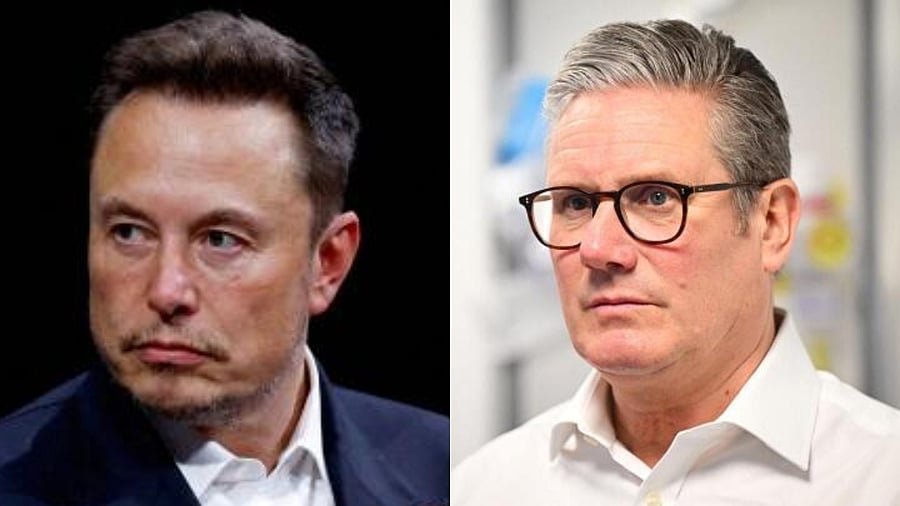
Tesla CEO Elon Musk (L) and UK Prime Minister Keir Starmer (R).
Credit: Reuters Photos
By Martin Ivens
Elon Musk, the world’s richest person, is making the running in UK politics and the establishment can't stop him.
To understand Musk’s impact, let’s look back to a politician of a different era: Enoch Powell, essentially the grandfather of all right-wing British populists. In 1968, the Tory politician, one of the most accomplished House of Commons orators of his day, tried to seize his party leadership by making a series of inflammatory speeches about non-white immigration. He was ostracized by the political class, became a hate figure on television and was condemned by mainstream newspaper commentators — although, alarmed by the popularity of his message, both parties hit the brakes hard on migration. Powell acknowledged that “for a politician to complain about the press is like a ship's captain complaining about the sea.”
Today, the traditional press has in large part been superseded by social media, and Musk is both an adept and owner of one of its most significant platforms, X. Political news, commentary and firefights are conducted in real time and without the filter of the old newspaper barons and hierarchies.
In recent weeks, the tech titan has leveled outrageous allegations against UK Prime Minister Keir Starmer and his Labour colleagues, to the dismay of the liberal commentariat. Musk has tweeted to his 211 million followers that “evil” Labour ministers should be put on trial for failing to conduct an official inquiry into the gangs of British men, largely of Pakistani or other Asian origin, who once raped and terrorized young white working-class girls in English cities. Labour argues that the seven-year long Jay inquiry into child abuse that reported in 2022 did the job.
Hand-wringing or exclamations of shock are a tempting response for Labour and the default mode of its allies. It will do no good; o utrage is the stock-in-trade of social media. The old British political parties must learn to adapt or dwindle into irrelevance — the fate that befell the Gaullists and moderate socialists of France and the Christian Democrats in Italy, outflanked by populists on right and left. Members of Parliament must avoid demagoguery, but Westminster can’t ignore issues that animate a majority of voters.
Suggestions that the new Labour government elected in July would tighten controls on social media first alerted Musk to a threat to X’s fifth-biggest market. His platform has led the way in dispensing with fact checkers and moderators (now copied in the US by Mark Zuckerberg’s Meta Platforms Inc.). Musk, seemingly obsessed with the land of his paternal grandparents, has turned up the volume ever since. He accuses Starmer of operating a “two-tier” policing system that favors non-Whites, and has proclaimed Tommy Robinson, a law-breaker who once led the far-right English Defence League, a free-speech hero.
Starmer’s protest that “I think most people are more interested in what is going to happen to the NHS, frankly, than what’s happening on Twitter” suggests he’s a dinosaur in a digital age.
Although the UK arguably suffers from a surfeit of expensive, time-wasting inquiries, Starmer would have done better to respond to the online storm by offering a third alternative rather than giving a flat no. The Jay inquiry devoted little of its attention to the rape-gang scandal; the government could simply commission a swift follow-up report to Jay addressing the police forces and social services that ignored the desperate plight of the girls, some of whom were dismissed as criminals.
Reform UK, the right-wing British populist party, immediately took up Musk’s call for an inquiry, only for its leader, Nigel Farage, to fall out with his multi-billionaire friend by refusing to endorse Robinson — British voters won’t touch a party that consorts with criminals. The Conservative leader, Kemi Badenoch, and her former rival, shadow Justice Minister Robert Jenrick, subsequently picked up the baton. Labour accuses its opponents of playing with fire.
Neither Badenoch nor Jenrick showed much curiosity about the rape gangs before Musk’s intervention. Successive Tory governments had 14 years to join the dots between these appalling crimes; they failed to act. Still, it’s the business of the official opposition to oppose, and Badenoch, 45, is a natural and frequent performer on the X platform who got to the top of the Tory party by addressing “woke” issues. She’s hardly going to stop now when she sees a threat emerging to her right from Reform. The ruling party doesn't get a free pass either. The crimes were overwhelmingly committed in constituencies controlled by Labour or its councils; the silence of its MPs has been thunderous down the years.
Against a backdrop of miscalculation and self-serving politics, a blind eye was turned to a horrifying abuse of girls. We should be more surprised that the topic has been swept under the carpet, than that it is back with a vengeance. Musk is here to stay, and so is the populism social media promotes — simply because there’s appetite for it. Musk has the attention of more voters than the old press barons ever did, without the complex economics of publishing to limit his scale and reach.
Musk can certainly be a malign force, peddling untruths, but Starmer can’t pretend he isn’t there or that his brand of high-octane political intervention will go away. It won’t. The seas, as Powell put it, have got rougher; a new generation of politicians must learn to navigate them.